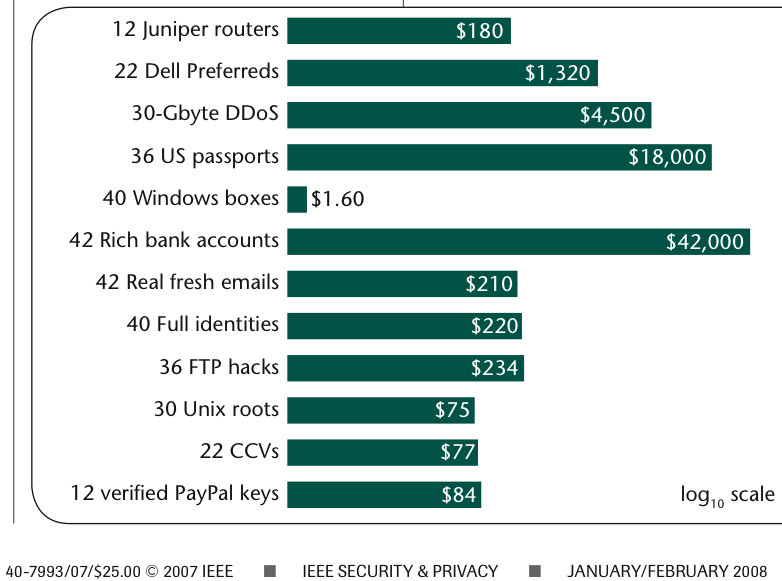September 11, 2008
US passports in 36 lots?
People on the crypto list were asking whether prices of street sales of insecurity could tell us stuff, like the drugs czars get from the price of street drugs. Dan Geer reports that the current cost of US passports is: $18k for 36, or $500 per unit. I'm not sure what the "lot of 36" entails.
He also reports a bunch of other things available for sale on the net black markets. Here's a selection of prices that would interest this audience:
 40 compromised windows boxes: $1.60
40 compromised windows boxes: $1.60
42 rich bank accounts: $42,000
42 real fresh emails: $210
40 Full identities: $220
30 Unix roots: $75
etc etc.
There is one really big lesson that these prices can tell you: their persistence and their apparent attention to the laws of supply and demand mean that these are goods that have value, and will probably always have value.
Using legislative tools to squat the goods of value falls foul of Goodhart's law. You can use the tool, but it just pops up somewhere else. Legislation then is like any other drug, every hit gives you less and shorter pleasure, so you need more of it each time. You see where this is going? Think prohibition, etc, and look for other solutions.
If we agree on that, and then ignore the laws of economics, as a society (which is the case with the drugs czars), then all other observations feel rather specious. However, we can glean some insights of the marketplace from the above.
Firstly, those rich bank accounts must be reliable end-to-end, to be worth $1000 each. That is, money laundering at the scale needed is functioning very well, notwithstanding 2 decades' effort to address it. Like the drugs people, the anti-money laundering people would be well advised to study some economics before making their next move.
Secondly, security hasn't improved any, over time, and if anything it has been bedded into a status quo. OK, we knew that, but it is good to have some evidence of it.
Thirdly, the ratios of utility + security remain between Linux boxes and Windows boxes. This is a complex issue, though: on the one hand, Linux boxes are used to run core tasks from high-end ISPs, so their value is much higher. On the other hand, there are some views that Windows might have got more secure, and Linux might still be being compromised in large numbers. We just can't see that possibility from these numbers, because they reflect two things (being the relative utilities and the relative securities).
It would be very useful to show compromise numbers between the various brands. Nothing much else gets people to stop bickering and fluffing up their security feathers, and gets them back to work. If anything, the emergence of universal skepticism of Microsoft's security in the early 2000s was what caused Bill Gates to write his famous memo and attempt a turn-around. The same thing seems to be true of other organisations; the don't burst their own bubble of security hubris, others have to.
My dream metric for someone to produce would be this: Which brand of browser were you using when you were last phished, or otherwise had your bank account stolen? Which email client? And which operating system?
I suspect that only then will the posturing stop and developers start to really work on solutions. The reward is oh-so-much clearer: get those numbers down.
Posted by iang at September 11, 2008 07:07 AM | TrackBack